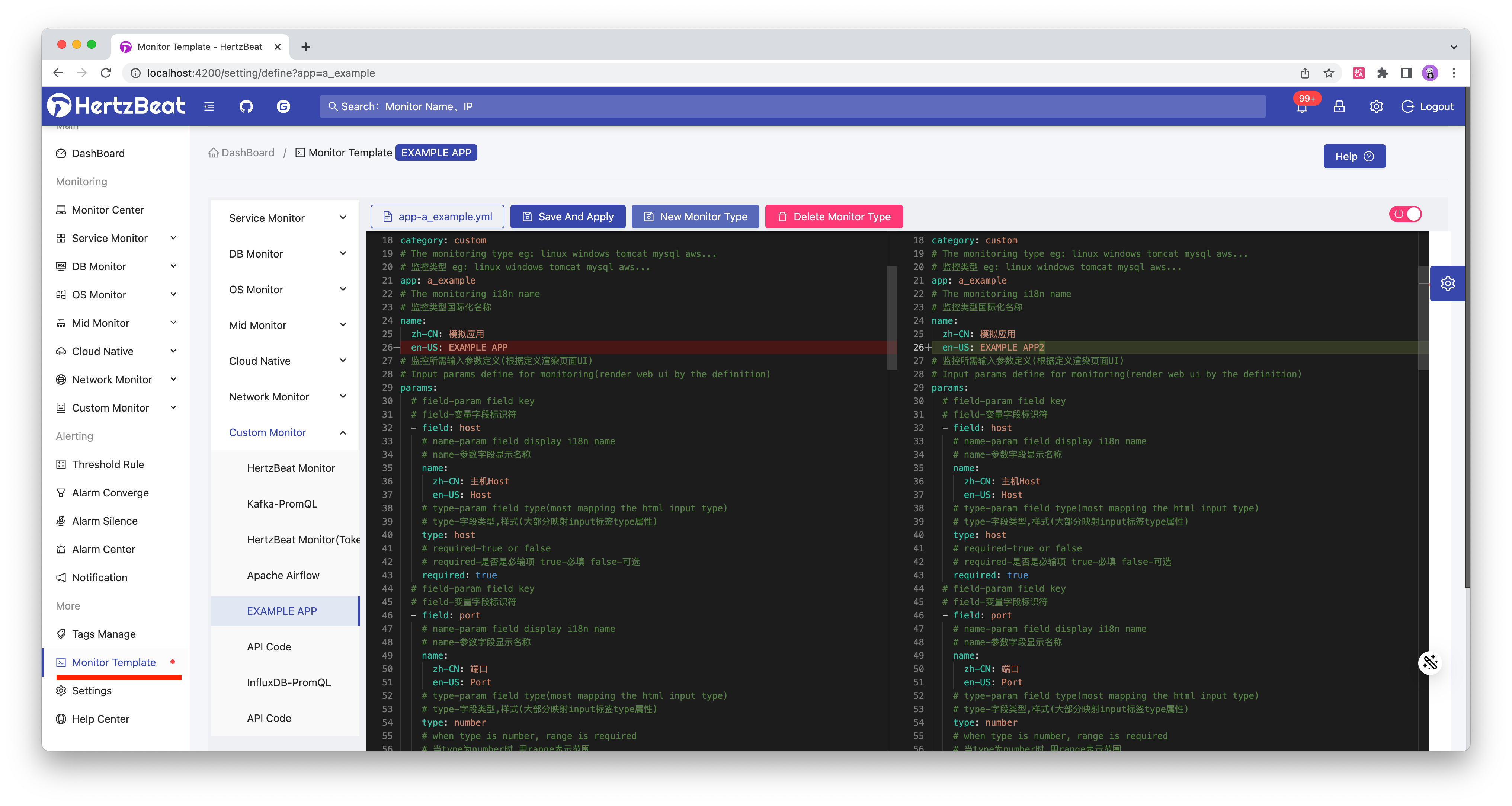JMX Protocol Custom Monitoring
From Custom Monitoring, you are familiar with how to customize types, Metrics, protocols, etc. Here we will introduce in detail how to use JMX to customize Metric monitoring. JMX protocol custom monitoring allows us to easily monitor Metrics we want by config JMX Mbeans Object.
JMX protocol collection process
【Peer Server Enable Jmx Service】->【HertzBeat Connect Peer Server Jmx】->【Query Jmx Mbean Object Data】->【Metric data extraction】
It can be seen from the process that we define a monitoring type of JMX protocol. We need to configure JMX request parameters, configure which Metrics to obtain, and configure Mbeans Object.
Data parsing method
By configuring the monitoring template YML metrics field, aliasFields, objectName of the jmx protocol to map and parse the Mbean object information exposed by the peer system.
Custom Steps
HertzBeat Dashboard -> Monitoring Templates -> New Template -> Config Monitoring Template Yml -> Save and Apply -> Add A Monitoring with The New Monitoring Type

Configuration usages of the monitoring templates yml are detailed below.
Monitoring Templates YML
We define all monitoring collection types (mysql,jvm,k8s) as yml monitoring templates, and users can import these templates to support corresponding types of monitoring.
Monitoring template is used to define the name of monitoring type(international), request parameter mapping, index information, collection protocol configuration information, etc.
eg:Define a custom monitoring type app named example_jvm which use the JVM protocol to collect data.
# The monitoring type category:service-application service monitoring db-database monitoring custom-custom monitoring os-operating system monitoring
category: service
# The monitoring type eg: linux windows tomcat mysql aws...
app: example_jvm
# The monitoring i18n name
name:
zh-CN: 自定义JVM虚拟机
en-US: CUSTOM JVM
# Input params define for monitoring(render web ui by the definition)
params:
# field-param field key
- field: host
# name-param field display i18n name
name:
zh-CN: 主机Host
en-US: Host
# type-param field type(most mapping the html input type)
type: host
# required-true or false
required: true
# field-param field key
- field: port
# name-param field display i18n name
name:
zh-CN: 端口
en-US: Port
# type-param field type(most mapping the html input type)
type: number
# when type is number, range is required
range: '[0,65535]'
# required-true or false
required: true
# default value
defaultValue: 9999
# field-param field key
- field: url
# name-param field display i18n name
name:
zh-CN: JMX URL
en-US: JMX URL
# type-param field type(most mapping the html input type)
type: text
# required-true or false
required: false
# hide param-true or false
hide: true
# param field input placeholder
placeholder: 'service:jmx:rmi:///jndi/rmi://host:port/jmxrmi'
# field-param field key
- field: username
# name-param field display i18n name
name:
zh-CN: 用户名
en-US: Username
# type-param field type(most mapping the html input type)
type: text
# when type is text, use limit to limit string length
limit: 50
# required-true or false
required: false
# hide param-true or false
hide: true
# field-param field key
- field: password
# name-param field display i18n name
name:
zh-CN: 密码
en-US: Password
# type-param field type(most mapping the html input tag)
type: password
# required-true or false
required: false
# hide param-true or false
hide: true
# collect metrics config list
metrics:
# metrics - basic
- name: basic
# metrics scheduling priority(0->127)->(high->low), metrics with the same priority will be scheduled in parallel
# priority 0's metrics is availability metrics, it will be scheduled first, only availability metrics collect success will the scheduling continue
priority: 0
# collect metrics content
fields:
# field-metric name, type-metric type(0-number,1-string), unit-metric unit('%','ms','MB'), label-if is metrics label
- field: VmName
type: 1
- field: VmVendor
type: 1
- field: VmVersion
type: 1
- field: Uptime
type: 0
unit: ms
# the protocol used for monitoring, eg: sql, ssh, http, telnet, wmi, snmp, sdk
protocol: jmx
# the config content when protocol is jmx
jmx:
# host: ipv4 ipv6 domain
host: ^_^host^_^
# port
port: ^_^port^_^
username: ^_^username^_^
password: ^_^password^_^
# jmx mbean object name
objectName: java.lang:type=Runtime
url: ^_^url^_^
- name: memory_pool
priority: 1
fields:
- field: name
type: 1
label: true
- field: committed
type: 0
unit: MB
- field: init
type: 0
unit: MB
- field: max
type: 0
unit: MB
- field: used
type: 0
unit: MB
units:
- committed=B->MB
- init=B->MB
- max=B->MB
- used=B->MB
# (optional)metrics field alias name, it is used as an alias field to map and convert the collected data and metrics field
aliasFields:
- Name
- Usage->committed
- Usage->init
- Usage->max
- Usage->used
# mapping and conversion expressions, use these and aliasField above to calculate metrics value
# eg: cores=core1+core2, usage=usage, waitTime=allTime-runningTime
calculates:
- name=Name
- committed=Usage->committed
- init=Usage->init
- max=Usage->max
- used=Usage->used
protocol: jmx
jmx:
# host: ipv4 ipv6 domain
host: ^_^host^_^
# port
port: ^_^port^_^
username: ^_^username^_^
password: ^_^password^_^
objectName: java.lang:type=MemoryPool,name=*
url: ^_^url^_^